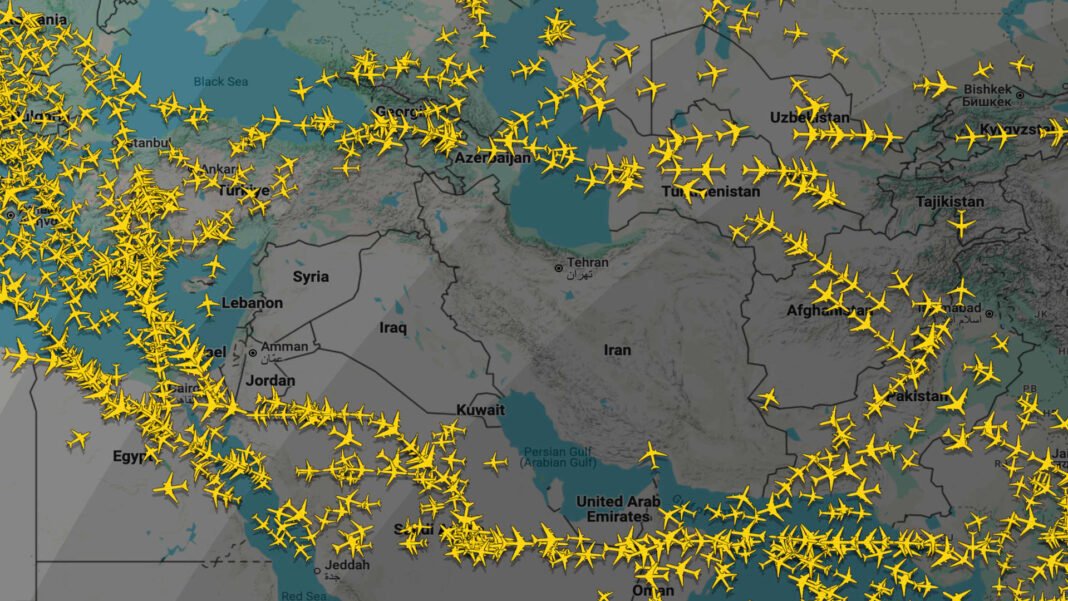Escalating Military Conflicts Trigger Severe Airspace Disruptions in the Middle East
Missile Attack on U.S. Base in Qatar Sparks Widespread Flight Diversions
Monday afternoon saw significant interruptions to air traffic over the Middle East after Iran launched a missile strike targeting a U.S. military installation in Qatar, intensifying regional tensions. This incident forced numerous airlines to reroute flights away from affected airspace zones.
Aviation data provider Cirium noted that more than 20 commercial flights bound for Doha were redirected, while four additional aircraft en route to Dubai reversed their courses. Simultaneously, Flightradar24 confirmed that the United Arab Emirates temporarily closed its airspace, with Bahrain also imposing short-term flight restrictions amid escalating hostilities.
Airlines Halt Operations and Modify Routes Amid Heightened Security Risks
In response to growing instability, Air India suspended all flights operating into and out of the Middle East region as well as routes connecting North America’s east coast and Europe until further notice. Flights inbound from North america are either returning to their origin points or being rerouted around restricted zones.
“We thank our passengers for their understanding during this unexpected disruption beyond our control,” Air India communicated through official channels.
This suspension follows earlier reductions implemented after a Boeing 787 crash near Ahmedabad remains under investigation,prompting increased safety measures across affected routes.
British Airways cancels Doha Flights Citing Passenger Safety Concerns
British Airways has suspended all scheduled services to Doha through Wednesday due to evolving security threats in the region. The airline emphasized prioritizing passenger safety and is actively updating customers on option travel options while closely monitoring developments.
Cautious Responses from Global Carriers Regarding middle Eastern Destinations
A number of international airlines such as Air France, Iberia, and Finnair have postponed or canceled plans to resume operations on select Middle Eastern routes amid ongoing volatility.
- American Airlines: Previously ceased flights into Doha due to rising conflict concerns;
- United Airlines: Suspended service into Dubai following recent escalations in regional tensions;
The Impact Extends To U.S.-Based Flights And Israeli Routes
The volatile environment has compelled several U.S.-based carriers to halt flights into Israel after retaliatory strikes earlier this month heightened friction between israel and Iran-backed groups. These disruptions add complexity for airlines already navigating restricted corridors as Russia’s closure of its airspace beginning early 2022 amid geopolitical conflicts involving Ukraine.
Navigational Detours Increase Operational Costs Across Airlines
The closure of critical Middle Eastern airspaces forces carriers onto longer flight paths that extend travel durations and significantly increase fuel consumption-driving up operational expenses industry-wide. Recent aviation analyses based on 2024 data reveal some transcontinental journeys now require up to 15% more fuel compared with pre-conflict routing options.
An Adaptive Approach to Aviation Security In A Shifting Geopolitical Landscape
“The current environment demands extraordinary versatility from global airlines,” aviation security specialists observe, emphasizing how evolving geopolitical dynamics continue reshaping flight planning strategies across continents.”

The Wider Consequences For International Travel Networks And Connectivity
This surge in military activity within vital transit hubs highlights vulnerabilities inherent within global aviation systems dependent on stable political conditions for smooth operation. As conflicts persist or escalate unpredictably throughout Gulf Cooperation Council states and neighboring regions, travelers should anticipate ongoing schedule adjustments impacting connectivity worldwide throughout 2024 and beyond.
Evolving Risk Management Strategies For Commercial aviation Operators
- Diversification: Increasing use of alternative hubs such as Istanbul or Muscat for layovers or refueling outside conventional conflict zones;
- Sophisticated Monitoring: Integration of real-time intelligence enables dynamic optimization of route safety;
- Crisis Preparedness: Enhanced contingency protocols ensure rapid responses when sudden closures occur;
Together these initiatives aim at reducing disruption impacts while ensuring passenger safety amidst an unpredictable global security climate affecting key international corridors including those involving MIddle East destinations.





